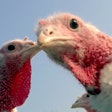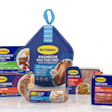
Jennie-O Turkey Store’s shift from a more commodity-driven business to one that emphasizes value-added products hasn’t gone without a hitch, but things are moving in the right direction, Hormel Foods Chairman and CEO Jim Snee said.
Hormel Foods on December 4 announced the financial results for fiscal year 2024, as well as the fourth quarter. Its net earnings for both the quarter and full year increased for both periods, but its net sales declined for both periods.
When Hormel Foods took a more detailed look at the impact of its Jennie-O Turkey Store subsidiary, both in a press release and through commentary on an earnings call, it exposed that its strength is in value-added products and commodity-oriented full turkeys were still a weakness for the company.
In the press release, it was reported that for the full fiscal year, net sales and earnings were impacted by lower whole bird turkey commodity markets. And during the fourth quarter, Jennie-O ground turkey was a source of year-over-year growth in the retail segment and volume and net sales growth in the foodservice segment was partially driven by branded Jennie-O products.
During the earnings call, analyst Heather Jones pointed out that Hormel’s had successfully made its pork business more oriented toward value-added products while reducing its exposure to commodity market volatility.
She asked Snee about the steps Hormel was taking to handle the turkey business similarly, particularly as it has been impacted by the highly pathogenic avian influenza (HPAI) outbreak and related trade barriers. She also wondered if Hormel and Jennie-O were entering into partnerships that would limit exposure to more commodity-volatile elements.
Snee first said that such a shift in the pork business has served the company well.
“I think back to my early days in the chair and how frequently we talked about pork operating margins and fast forward eight, nine years, we're not talking about that because of those steps that we took. It still exists, but it's obviously a small portion of the portfolio and the impact that it has,” he said.
For several years, Hormel has been working toward the same goals with “appropriately sizing the supply side” of the turkey business, he said.
"What has hindered that is the most recent avian influenza outbreak, because supply then became obviously very disrupted and we weren't able to fully execute some of the actions that we had planned and wanted to put in place," Snee said. "But we are on that track and we agree with your assessment that our goal is to create a demand-driven business, and that demand is our focus on the value-added business. When we think about the success of lean ground turkey, that is the No. 1 scanned item in our company. When we think about how that aligns with today's consumer, that opportunity is only going to continue to increase.”
Snee said the work that Hormel has done to integrate Jennie-O into its foodservice segment has yielded positive results.
“You can see how we are setting this business up for long-term success while minimizing the volatility,” said Snee. “And so we are focused on the value-added business, lean ground turkey at retail (and) broad offerings in foodservice. It is a very important part of this portfolio just as we think about what's happening in the consumer environment.”

















